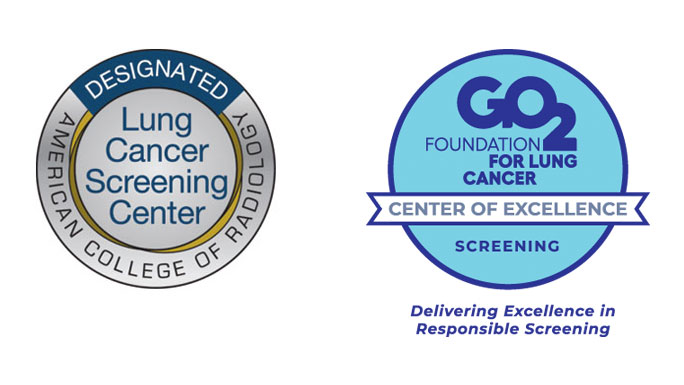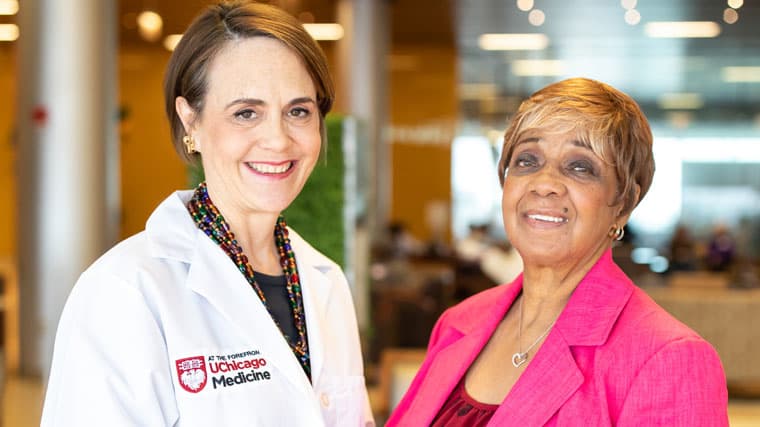Lung Cancer Screening
Is lung cancer screening right for you? Lung cancer does not cause symptoms in its early stages. By the time a patient experiences symptoms, the cancer may be advanced and difficult to cure.
The good news is scientific evidence shows that lung cancer screening can help. With screening, lung cancer can be diagnosed at an early stage when it's more curable. Lung cancer screening involves a low dose computed tomography, or LDCT scan of a patient's chest to make detailed pictures of the lungs. Radiologists examine the images for abnormalities that could indicate cancer.
The exam is painless, non-invasive, and only takes a few minutes. LDCT screening is recommended for patients who have an increased risk of developing lung cancer, but who are still in reasonably good health. You must meet certain criteria to be considered for lung cancer screening.
There are some minor risks associated with LDCT screening. For example, not all nodules are lung cancer, and there may be a need for additional tests and procedures. This can cause anxiety for some patients. Discuss the risks and benefits of LDCT with your doctor.
If an abnormality is found on your lung, your doctor may recommend additional tests or schedule a follow-up scan. If your screening shows you may have cancer, our multidisciplinary lung cancer team works together to determine which treatments will be most effective for you. Even if your screening is normal, you should still stop smoking.
The best way to reduce your risk of developing lung cancer is to quit smoking. Our Courage to Quit smoking cessation program can assist you in taking the right steps toward a smoke-free life. Lung cancer screening can save your life. UChicago Medicine offers lung cancer screening in several locations. Want more information about lung cancer screening? UChicago Medicine is here to help.
Lung cancer is the leading cause of cancer-related deaths in both men and women in the United States. Often, lung cancer will have no symptoms, and by the time patients show signs of the disease, the cancer has progressed to an advanced stage. Proactive measures, such as lung cancer screening, can help diagnose lung cancer in its earlier stages and improve outcomes for patients.
The University of Chicago Medicine lung cancer prevention and treatment team is a collaboration of specialists from oncology, pulmonology, radiology, surgery, pathology and more. These experts work closely together to diagnose and treat each patient. Our goal is to provide the highest level of patient care at every stage of treatment, which includes offering lung cancer screening to qualified patients.
Schedule a lung cancer screening
You can schedule a lung cancer screening by calling 773-702-2290 or complete the appointment request form below.
To schedule a screening at one of the Ingalls campus locations in Calumet City, Flossmoor, Harvey, or Tinley Park, call 708-915-6698 to make your appointment.
Lung cancer screening is a method of monitoring patients who are in reasonably good health but have an increased risk of developing lung cancer. Through screening, physicians can identify potential early-stage cancer and begin treatment sooner to reduce the number of patients who progress to end-stage cancer or die from the disease.
Specialists at UChicago Medicine perform a low-dose CT (LDCT) scan of the patient's chest to obtain a detailed image and analyze it for any abnormalities. A LDCT scan is a quick, painless, non-invasive diagnostic test that allows physicians to detect very small abnormalities or nodules in the lungs that could indicate cancer. Additionally, during a low-dose CT, patients are exposed to less radiation during the test, and because it is a CT scan, there are no issues with claustrophobia (unlike with MRI scans).
Typically, screening is performed annually until the patient reaches 77 years old or has ceased smoking for 15 or more years.
Studies have shown that lung cancer screening can reduce the risk of death from lung cancer by 20 percent. Some people develop rapidly growing cancer that can spread before detection, so while it is not a guaranteed solution to preventing fatal lung cancer, it can significantly reduce your risk. In addition to screening, quitting smoking is the best method to reduce your risk for lung cancer.
Several key factors are used to determine whether someone is an ideal candidate for screening, such as age, amount smoked and more. Our criteria for lung cancer screening are as follows:
- Must be between 50 and 77 years of age
- Asymptomatic, not experiencing any signs or symptoms of lung cancer
- Have at least 20 pack years (One pack per day for 20 years OR two packs per day for 10 years. See "pack year" description below.)
- Current smoker or quit within the last 15 years
- Have a written order for LDCT from a qualified health professional following a lung cancer screening counseling that attests to shared decision-making having taken place before the first screening CT
Each candidate must meet all of the criteria above in order to be considered for lung cancer screening.
Pack years are calculated by using the number of years you smoked and the amount of cigarettes smoked each day. Examples of 20 pack years include: 20 years where you smoked one pack a day or 10 years where you smoked two packs a day. Your physician can help you calculate your pack years based on your smoking habits.
The test is designed to screen high-risk patients before they begin to show symptoms of disease, so the largest benefit is the potential to diagnose lung cancer in its early stages and begin treatment immediately in an effort to reduce mortality from the disease.
There are a few risks associated with lung cancer screening that you should consider when deciding if screening is right for you. Possible drawbacks include:
- Additional tests, procedures and follow-up: As abnormalities are discovered during testing, this could lead to additional tests and procedures, such as subsequent scans or biopsies, in order to obtain a definitive diagnosis.
- False negatives/false positives: False negatives occur when the test did not detect an abnormality, but lung cancer is present. This can result in delayed treatment. Alternatively, when physicians believe the results are abnormal, but there is no cancer present, this is called a false positive. Both situations can lead to additional anxiety and distress.
- Diagnosing non-harmful cancer: Physicians cannot be sure which cancers will ultimately become harmful. So, if cancer is found, your doctor will likely recommend treatment. This could theoretically result in treating non-harmful cancer.
You and your physician should discuss the benefits and risks together to decide if lung cancer screening is right for you.
The most effective way to reduce your risk of developing lung cancer is to quit smoking. Experts at UChicago Medicine are committed to your health and can assist you in taking the right steps toward a smoke-free life. Our specially trained clinic staff is available to help you with both behavioral and medical solutions for smoking cessation.
Learn more about our Courage to Quit ® smoking cessation program.
Additional resources include:
The Illinois Tobacco Quit Line: 1-866-QUIT-YES or www.quityes.org
The American Lung Association Tobacco Quit Line at 1-800-LUNG-USA or https://www.lung.org/help-support/lung-helpline-and-tobacco-quitline.

We're proud to be designated a Lung Cancer Screening Center by the American College of Radiologists and a GO2 Foundation for Lung Cancer Screening Center of Excellence. These important designations signify that our program has met rigorous quality standards to provide safe and effective lung cancer screening services.
Lung Cancer Screening Finds Cancer Early When Chance of Cure is High
Former long-time smoker Marilyn Nesby, 72, was at high risk for developing lung cancer. Fortunately, a screening test called a low-dose CT scan detected cancer at an early stage, before it had spread.

Convenient Locations for Lung Cancer Screening
Request an Appointment
Call for faster scheduling assistance:
- Chicago (Hyde Park and River East), Crown Point and Orland Park: 773-702-2290
- Calumet City, Flossmoor, Harvey and Tinley Park: 708-915-6698
If you have symptoms of an urgent nature, please call your doctor or go to the emergency room immediately.
For Referring Physicians
To refer a patient for lung cancer screening, please call 773-702-2290.
* Indicates required field

Cancer Care Second Opinions
Request a second opinion from UChicago Medicine experts in cancer care.


